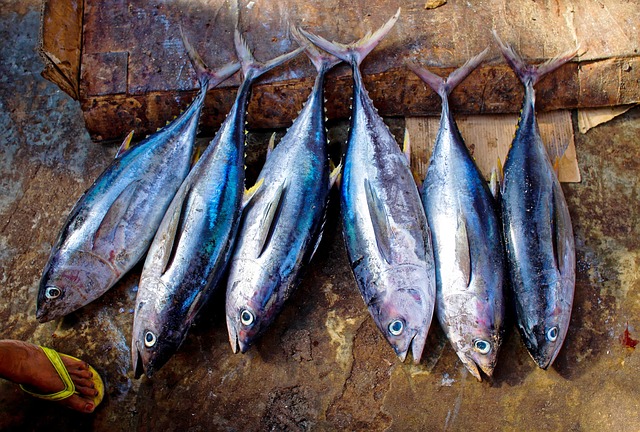Illegal fishing in Southeast Asia: a multibillion-dollar trade with catastrophic consequences

Illegal, unreported and unregulated (IUU) fishing remains a perennial problem in Southeast Asia. While it’s a region-wide phenomenon, it has been particularly pronounced in two areas. The first is the Gulf of Thailand, where the overall catch per unit effort has plummeted by 86% since 1966, making those waters among the most overfished on the planet. The second is Indonesia, which is estimated to lose nearly A$4 billion a year to illegal fishing. The most frequent violators are from China, Thailand and Vietnam, and countering their activities has now been cast as a national security priority by the Joko Widodo administration.
This ‘black industry’ ranges from small-scale violations by local artisanal fishermen to mass illicit enterprises conducted by large-scale open factory trawlers. It includes any of the following (PDF): operating in another state’s territorial waters without an access agreement (poaching), falsifying catch documents, using illegal methods or gear, harvesting protected species, fishing in restricted zones, contravening closed-area or closed-season stipulations, and transshipping at sea to avoid landing a haul in the same country where it was fished.
The drivers for IUU in Southeast Asia are multifaceted. Perhaps one of the more important causal factors is the weak fishing regulations of many states in the region. Certain destructive practices are not considered illegal and fish caught by pirate vessels can be landed licitly in those states’ waters. Thailand is a prominent case in point. The country’s Fisheries Act requires fishermen to be caught in the act of illegal fishing or other violations for the evidence to stand up in court.
There’s also a dearth of scientific knowledge in Southeast Asia to inform the development of sound exploitation management models. That’s particularly true of statistical information on existing fish stocks, the lack of which has severely impeded the ability of coastal authorities to make informed decisions on sustainable and responsible fishing practices.
A further consideration is the difficulty of regulating flags of convenience, which are routinely used to disguise illicit industrial trawlers. Registration in states such as Panama, Liberia, Honduras and Belize is generally simple and inexpensive and has directly contributed to ‘flag hopping’—a practice whereby ships regularly change flags to make it more difficult for inspection and control services to keep track of them.
Finally, consumer demand in Asia, Europe and North America for seafood—especially tuna, cod, mackerel and squid—is driving rampant overfishing of those stocks. Declining supplies have led to a progressive rise in market prices, which has further motivated the desire to poach. Unfortunately, there’s a high degree of ignorance about the adverse impact of such actions. Across the region, a growing number of artisanal fishermen are resorting to illegal gear, such as micro-mesh nets, to make up for reduced catches, which in turn has further reduced the size of already dwindling populations.
IUU has negatively affected Southeast Asia in several ways. Annually it costs the region billions of dollars, accounting for more than 2.5 million tonnes of fish a year, or as much as a third of the regional catch (compared to just 9% in the northwest Atlantic).
IUU also has deleterious environmental consequences. The intensive use of drift nets has been particularly harmful, causing major damage to fragile coastal and marine ecosystems by reducing the topography of the seabed to a smooth, flat muddy surface. Thailand’s underwater grass system has been severely degraded by that type of bottom trawling, threatening the habitat of some 149 fish species. The routine employment of dynamite and/or cyanide to flush out fish has been just as ruinous and is thought to be responsible for destroying as much as 70% of Indonesia’s coral reefs.
Sociopolitically, IUU has contributed to poverty in coastal communities, forcing artisanal fishermen who can no longer afford to make an honest living to adopt illicit practices themselves. Often they cross over and poach in foreign waters, complicating and straining relations between neighboring states—something that has been especially evident in the countries bordering the Gulf of Thailand.
Geostrategically, Chinese IUU has heightened the risk of interstate conflict in Southeast Asia. Helped by generous subsidies on fuel and shipbuilding from Beijing, Chinese fishermen are now traveling further from their own waters to illicitly land viable catches. Much of that poaching is taking place in resource-rich areas in which maritime disputes are already at flashpoint among claimant states. The spectre of a confrontation at sea escalating into a crisis remains—and, indeed, has arguably already happened in clashes that have taken place in the contested islands of the South China Sea.
Overfishing in the Gulf of Thailand has also generated economic pressures that fuel the continued use of slave labor. Exhausted fish stocks mean that vessels are staying at sea longer and going further afield for ever-diminishing returns. In turn, operators are using human trafficking networks to lure people with false offers of paid employment in factories, only to abduct them and force them to crew ships for months at a time for little or no money. The practice of transshipment at sea—whereby large cargo vessels resupply fishing boats and pick up their catches—exacerbates the problem, allowing commercial fishing trawlers to stay out at sea indefinitely and turning those boats into de facto floating prisons for abused workers.